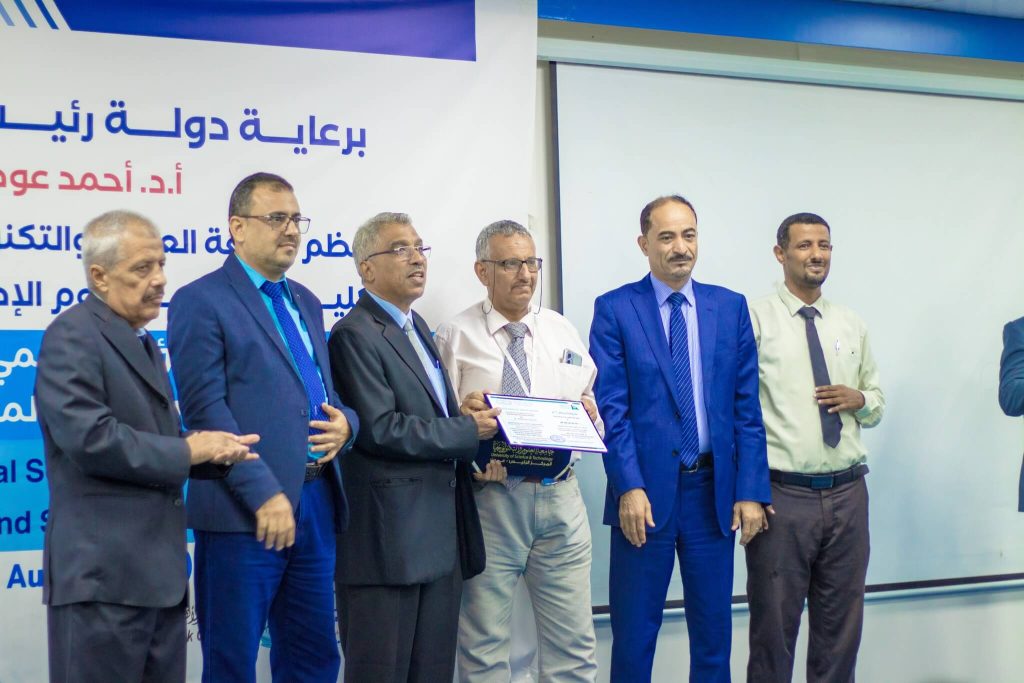Today, Tuesday, August 20, 2024, the first international scientific conference concluded: “Administrative Sciences and Sustainable Development - Reality and Ambition”, which was organized by the University of Science and Technology - Main Center, Aden, implemented by the College of Administrative and Human Sciences at the University, and hosted by the University building in Aden, during the period from August 18-20, 2024, under the generous patronage of His Excellency the Prime Minister, Dr. Ahmed Awad bin Mubarak, and with the supervision and interest of the Ministry of Higher Education, Scientific Research, Technical Education and Vocational Training.
This morning, a closing ceremony for the conference was held at the University of Science and Technology building in Aden, attended by Professor Dr. Khaled Basalim, Undersecretary of the Ministry of Higher Education and Scientific Research for the Educational Affairs Sector, and a number of directors, academics, researchers and interested parties.
Dr. Munir Al-Abbadi, Assistant President of the University of Science and Technology for Student Affairs, Centers and Branches, spoke at the closing ceremony. In his speech, he noted the importance of scientific research in addressing various societal issues, which would benefit society.
At the end of the ceremony, the conference participants were honored, as well as the official sponsors of the conference.
According to the final statement of the conference, arrangements for holding this international scientific conference began in January of the current year 2024. The conference aimed to achieve five scientific and research objectives in the field of administrative sciences and sustainable development, and for (6) axes. The conference was attended by a number of ( Supervisory and specialized committees, with (58) members from various academic and administrative units at the university, including (27) members of the scientific committee, from: Yemen, Egypt, Jordan, Morocco, and Sudan. In addition to the participation of (15) male and female students in organizing the conference.
The number of research papers participating in the conference was (68) accepted papers after the arbitration and review process, with the participation of (115) male and female researchers, and a percentage of (25%) female participation.
The number of countries participating in the conference was (9) Arab and regional countries. The number of Yemeni universities participating was (14) universities, most of which were governmental universities, while the number of participating Arab and regional universities was (16) universities.
In addition, the percentage of research presented at the conference reached (97%) of the research approved for participation in the conference. (12) scientific sessions were held to discuss the conference research, where specialized scientists in the conference topics from the universities of Aden, Sana'a, Taiz, and Hodeidah participated in managing these sessions.
The closing statement of the conference included a number of recommendations, most notably the emphasis on the need for countries and business organizations to pay attention to leadership behaviors and apply governance principles, given their positive relationship with sustainable development, and calling on ministries and business organizations to work on instilling a culture of sustainable development among their employees at various levels, as well as calling on countries, international organizations and business organizations to pay attention to projects concerned with addressing problems related to economic development and its sustainability, and recommending working to develop links and establish good relations between various organizations and stakeholders with them at the local, regional and international levels, as well as recommending activating cooperation and joint work between various community organizations in the public and private sectors, in a way that enhances sustainable development, urging the exchange of information, expertise and external experiences, and enhancing cooperation with Arab countries and the international community to overcome the challenges of sustainable development, and calling for benefiting from the results and recommendations of the conference research in various applied fields and community service, and other recommendations.

